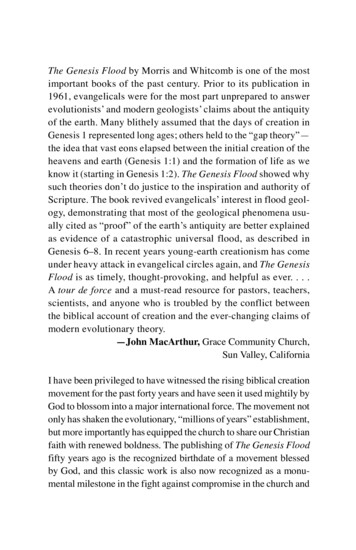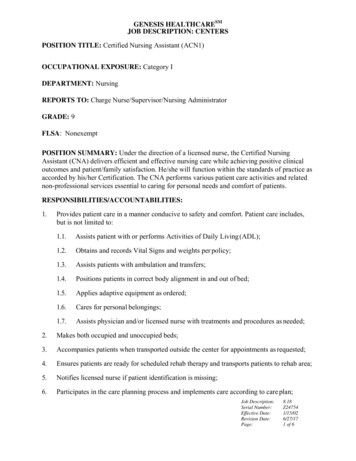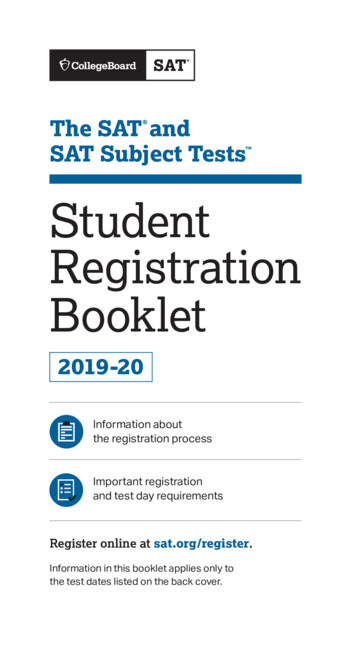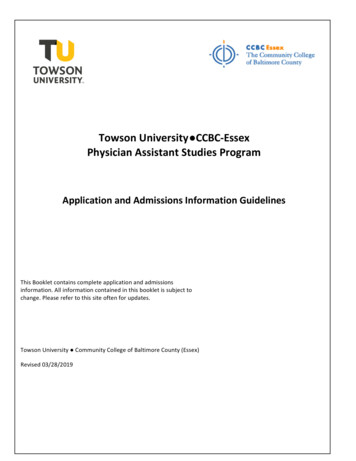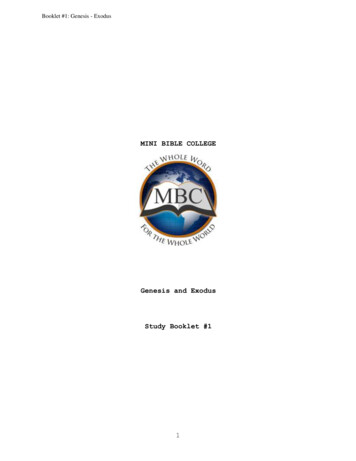
Transcription
Booklet #1: Genesis - ExodusMINI BIBLE COLLEGEGenesis and ExodusStudy Booklet #11
Booklet #1: Genesis - ExodusIntroductionWelcome to the Mini Bible College. We will be studying theBible from beginning to end together over the course of the fromGenesis through Revelation. We will view the panoramic pictureeach book of the Bible presents, study its outline, and, mostimportantly, focus in for a closer look at ways to apply what welearn.The Bible can be a confusing book.It is hard to keep trackof what happened when and who was related to whom and what it epuzzle, adds up to a glorious whole. At the end of our triptogether, my prayer is that you will have gained an understandingof how the Bible fits together. Having toured all the books ofthe Bible, you will come away with a snapshot image of each one,and you will be able to place it in the context of the history ofGod and man. You will have seen how God worked in Old hChrist’scoming and why. What you have believed with your heart willbecome established in your mind, and you will experience a htoothers.I hope you will plan to stay with us through the entirestudy, and that you will invite others to join us as we getacquainted with the most important book in the world, the Bible.Pack your bags and get on board, because we’re ready to begin!Tools for the TaskThe Apostle Paul tells us that the only way we can keep frombeing embarrassed or ashamed when the subject of the Bible comesup is to become “a workman.”The only way to really understand2
Booklet #1: Genesis - Exodusthe Bible is to work at it.I would like to challenge you here,in the beginning of this Bible study, to commit yourself toearnest and wholehearted study of the Bible.No book could bemore deserving of dedicated, diligent, and determined study!Ifyou desire to go deeper than these survey studies take you, makea commitment to find other tools that will enable you to digdeeper into the Scriptures.Besides diligence, there are some tools that will help youas you delve into these studies.The first one is obvious: youwill need a Bible, and if possible, more than one translation ofthe Bible.And, of course, you will need a notebook and pen.Just as any job around the house is accomplished more easilyand with better results when the right tools are used, so Biblestudy is more effective when you use the resources available toyou.Make it a goal to accumulate the study aids we have listed,and you will be amazed at the difference they make.Chapter 1The Bible and Its OrganizationIts Meaning and OriginBefore we begin our study of the individual books of theBible, let us look at the Bible itself, as a whole.Why is itcalled that, and why is it so often referred to as “The HolyBible?”The word “bible” comes from the word “biblia,” which is theplural of the Latin word for “books.”So “bible” simply means “acollection of books”- sixty-six, to be exact.The word holymeans, “that which belongs to God” or “that which comes fromGod.”So The Holy Bible is, literally, “The holy little books of3
Booklet #1: Genesis - ExodusGod,” or, “a collection of books belonging to and coming fromGod.”The Bible is also referred to as the Word of God.Why?Because of statements made by apostles, like Peter and Paul.Second Timothy 3:16-17 is a good example: “The whole Bible wasgiven to us by inspiration from God and is useful to teach uswhat is true and to make us realize what is wrong in our lives;it straightens us out and helps us to do what is right.It equipped to do good to everyone.” (emphasis added)Over and over, we are assured that the Bible is not merely acollection of human writings about God.Instead, it contains thewords of God Himself, written through the pens of men, perhaps asmany as forty or more over a period of 1500 to 1600 years.Theprocess by which God moved these men to write these books n.”theScripture was ever thought up by the prophet himself, for theprophecy never had its origin in the will of man, but men spokefrom God as they were carried along by the Holy Spirit” (2 Peter1:21).The Greek word for “carried” presents a beautiful image.is the word “phero.”ItImagine being in a boat carried along bythe tide, or blown along by the wind in the sails, and you havethe idea of inspiration as it is presented here by Peter.Its OrganizationHaving established what the Bible is, let us now look at howit is organized.notappearContrary to what you might expect, the books dochronologically,noraretheygroupedInstead, they are organized by type and message.byauthor.The two maingroups of books are the Old Testament and the New Testament.4
Booklet #1: Genesis - ExodusThis has not always been the case, for obvious reasons.In thedays of Jesus, for instance, there was no such thing as an OldTestament and a New Testament.The New Testament had not beenwritten yet, so the books that existed in the days of Jesus weresimply called “The Word of God” or “The Scriptures.”It wasafter the New Testament was written and brought together into acollection of books that the distinction was made between Old andNew Testaments.The essential message of the Old Testament books is criptures, God and man were in harmony with each other.totheBut Godmade man a creature of choice and man chose to turn away fromGod.Because God cannot tolerate rebellion (sin), God turnedaway from man.Thus, there was a “divorce” between God and man.That divorce between God and man is the fundamental problem withwhich the all the Scriptures deal.In the Old Testament, God says to us, “Will you believe Mewhen I tell you I'm going to do something about that divorce?”In the New Testament, God is saying to us, "Will you believe Mewhen I tell you that I did do something about that divorce?"Yousee, the Old Testament books say, “Jesus is coming, and He isgoing to reconcile that divorce between God and His creatures.”The New Testament tells us this good news: “Jesus came, and whenJesus came He did reconcile that divorce between God and man.”Besides the major division of the Old and New Testaments,there are further divisions within each Testament.The books ofthe Old Testament come under five different headings.First, there are the five books of the Law.In these books,God tells us what is right and what is wrong, giving us Hisstandard for righteousness.Next come the ten History books, which tell us, essentially,that sometimes the people of God obeyed those Law books and5
Booklet #1: Genesis - Exodussometimes they did not.warnings for us.Their stories serve as examples andThe key verse for all the history recorded inthe Bible is found in the New Testament.Paul told us thateverything happened to the people we read about in the Bible forexamples and warnings.When they obeyed the Word God gave them,they were examples for us.When they did their own thing, theywere and are warnings for us.The History books are followed by the books of Poetry.Inthe Poetry books God speaks to the hearts of His people as theytry to live out His Word in this world.For instance, the hentheyareThe Book of Psalms speaks to their hearts when they areworshipping. The Book of Proverbs speaks to their hearts whenthey need the kind of wisdom that equips them to do business andrelate to people.The Song of Solomon speaks to their heartswhen they are making love. Each of these books contains practicalhelp and encouragement for believers.The next section of the Old Testament is the largest.called The Prophets.It isThis section is further broken down intothe Major Prophets and the Minor Prophets - not because of theimportance of their messages, but simply because of their length.It took the major prophets longer to say what they wanted to say!In the New Testament we have five kinds of books as well.First there are the four biographies of Jesus (also called theGospels), written by Matthew, Mark, Luke and John.one History book, the Book of Acts.or letters.writtenbyestablishedafterwrittenanbyThen there are the epistles,They fall into two categories: the Epistles of Pauland the General Epistles.lettersNext comesthetheHalf the New Testament consists etic book, The Book of tersthereiswereone
Booklet #1: Genesis - ExodusAs we study the Bible, come to the Old Testament realizingwhat its primary message is: Jesus is coming.Old Testament is really all about.That is what theCome to the New Testamentlooking for this message: Jesus came.That is what the NewTestament is all about.Chapter 2The Bible and Its Purpose, Authorship, and OriginsIts PurposeFromGenesisthroughabout Jesus Christ.Revelation,theBibleisbasicallyThe Bible is not a history of civilizationor a scientific textbook on creation.Some people think that theBible is primarily a handbook for living a good moral life; manythink that Jesus was only presented as a teacher and example ofthis lifestyle.InsupportofJesus Christ is the Bible’s one central . The first of these four purposes is this: to presentJesus Christ as the Savior and Redeemer of this world.Now, forus to understand this first purpose, we need to understand why asavior is necessary.So the second purpose of the Bible is toprovide for us the historical context in which Jesus came.But in Genesis 12, the story slows way down.From thischapter all the way through Revelation — all 1,178 remainingchapters — the plot line narrows.From this point on, the storyis mainly about Abraham and his descendants, especially that oneDescendant of his through whom all the nations of the earth areblessed, the Messiah, Jesus Christ.Once we have understood those first two purposes, the secondtwo are obvious.Number three is to lead the unbeliever into7
Booklet #1: Genesis - Exodusfaith; and number four is to show the believer how God wants abeliever to live.Its AuthorshipWho wrote the books of the Bible?language, or languages?When and where?In whatDo any original manuscripts still exist?Who decided what to include in the Bible and organized it as itis today?You do not have to study the Bible for long beforethese kinds of questions occur to you.Let us consider, first of all, the authorship of the Bible.We have already said, of course, that God wrote it, through thepens of men (we will talk about who those men were later).Butfirst there are two terms we need to understand when we talkabout God writing these books.The first one is revelation.Revelation is the general term that covers all the ways that Godreveals truth to man — through nature, through the Holy ermisinspiration.This refers to what the theologians call “SpecialRevelation.”The Bible is the special revelation of God.a beginning.It has an end.It hasOver a period of about sixteenhundred years, God moved men to write these books.But when thelast words of the Book of Revelation were written, the SpecialRevelation was complete.The Special Revelation, or that kind ofinspiration, is no longer happening.Now, having established that God wrote the books of theBible, we also have to say that men wrote these books.These menwere kings, fishermen, shepherds, generals, priests and a figpicker.One was a physician.One was a publican.kinds of men.8They were all
Booklet #1: Genesis - ExodusIts OriginsWho decided what writings should be included in the Bible,and when?InHow were the decisions ment was officially compiled, although it had already beenin use for three or four hundred years.basedonthereliabilityoftheirThe books were includedhumanreputation as a prophet or scribe.authorsandtheirMost of these books werewritten in Hebrew.TheGreek,NewTestamentwereselectedCouncil of inaboutwere692writtenA.D.atintheThe standard by which these books werecanonization,anditconsistedofthreecriteria:1. Did an apostle or the close associate of an apostle writethis book?2. Did the book have the kind of spiritual and devotionalcontent that ministered grace to the believer?3. Did the content of this book agree with the content ent among the churches regarding the inspiration ofthis book?How is it that books written so long ago are still ved.Obviously, we do not have any of the original manuscripts; paperdoes not last that long.However, we have very good copies.Great care has also been taken in translating these documentsinto our modern language.In ConclusionHow can we really know that the Bible is the inspired Wordof God?How can we be sure the right books were chosen, that no9
Booklet #1: Genesis - Exodusmistakes were made in the copies or translations?one way to know, and Jesus tells us what it is.man wills to do, he will know.”There is onlyHe said, “If anyIt is found in your heart.Whenyou come to the Word of God with the will to do what it says,when you act on what you find there, it makes such a tremendouschange in your life that you then say, “That is the Word of God.It has to be.There is no other explanation.”Chapter 3How to Study the BibleWhen it comes to really studying the Bible, we need to becareful and wise.partprocess:One effective method of study is this relation.Observation comes first.As you read the passage through,you should be asking the question, “What does it say?”Nextcomes interpretation, during which you ask, “What does it mean?”Then comes application.does it mean to me?”In this step, you’re questioning, “WhatCorrelation asks the question, “How doesthis Scripture relate to all the other books of the essayandwhattheymeanisBut if you do not act on them, your study has beenWhen you get to that section called "application,"you can find out what a passage means to you by making that broadquestion more specific.Try these questions to get you started: Are there any examples to follow? Are there any warnings to heed? Are there any commandments to obey? Are there any sins to forsake?10
Booklet #1: Genesis - Exodus Are there any new truths about God or Jesus Christ? Are there any new truths about my own life?When studying the Bible, there are some rules that shouldguide us.Here is one.When you come to a passage of Scripture,remember this: Even if there is only one interpretation, therecan be a thousand applications.You may feel strongly about howa particular passage applies to your life, but please allow theHoly Spirit to work differently in someone else’s life throughthat Scripture.Second, since the Bible is a book about Christ, you shouldlook for Christ all the way through the Scriptures as you study.Third, when you come to a verse that seems puzzling or obscure,always interpret it in light of verses that have a clear meaning.There are many verses of Scripture that are hard to understand.There are many verses that are not hard to understand.Rely onthe clear ones to guide your thinking about the more difficultones.This next one is important: never come to a passage ofScripture with your mind already made up as to what it means.You may be absolutely correct in the thinking you bring to it;but then again, you may not be!It will be difficult for theHoly Spirit to teach you if you are certain you already know whatthere is to know.Another important principle, especially if you teach theScripture, is to be willing to obey it yourself before you teachit to someone else. And here is another one.Always rememberthat God speaks to us through His Word, so approach the Word ofGod prayerfully, asking God to reveal things to you personallythrough the Holy Spirit.Here is another hint: always consider the context of context, you know how your own words can seem to mean something11
Booklet #1: Genesis - Exodusyou never intended.Likewise, Scripture can be used to provealmost any point if you isolate a verse from the verses that comewith that verse.Studying a single verse apart from its contextis almost sure to lead to misinterpretation.And now, having established a foundation for our study ofthe Word, we will dig in to the first book, Genesis.As webegin, my prayer for you is this: that you will get into the Wordof God and let the Word of God get into you.Chapter 4Genesis—A Book of BeginningsThe Book of Genesis is about beginnings.literally means “beginning.”The word “genesis”This book constitutes the beginningof the Bible, but it is also a book about beginnings.The firstbeginning it describes is the beginning of the etellsisusaboutnow.ThisHe tells us about erstandSeeing how sin began helps usHeshowsusHisfirstcommunications with man, and those first simple conversationshelp us see how He communicates with us as well.In the conflictbetween Cain and Abel, we see how conflict begins, and we startto understand the conflict we experience today.In chapters six to nine, we read about the world’s firstcatastrophe, the flood.And in this story, we find a picture ofsalvation.BecauseofNoah’sdestruction.And if we have faith, we, too, can be saved fromthe destruction of sin.12faith,Godsavedhimfrom
Booklet #1: Genesis - ExodusThroughout the remainder of the book, we find story afterstory showing us that God is, ultimately, the One in charge.With the repetition of that theme, can we doubt that He is stillin charge heBookofAs you do, ask yourself the questions: What does thissay about the way things were?way things are today?What does that imply about theAnd how should that change my thinking andmy life?Chapter 5Is Creation Credible?The Book of Genesis — indeed, the entire Bible — begins withthe story of creation.Now, for all the significance of that fact, the account onlytakes up a chapter and a half.Why do you think that is?As wediscussed in our last chapter, this book was written not only totell it like it was, but also so that we can understand things asthey are.God does not owe us an explanation.to defend Himself.He does not needHe does not give us this creation accountbecause He believes He owes us an explanation of how He createdeverything.Still, we cannot pass over this book without a discussion ofwhat is probably the most frequently debated issue in the Bible.There are typically two extremes on the subject of creation.First of all, there is the position that says that the creationaccount in Genesis is not scientifically reliable, so thereforethe Bible cannot be the inspired Word of God.isthepositionthatthequestion13isThe other extremenot,“IstheBible
Booklet #1: Genesis - Exodusscientifically reliable?” but, "Is science biblically reliable?"Those who hold this position say, "The Bible is not on trial.Science is on trial."The real issue is this: Are the Bible and science compatiblewhen it comes to how the world was formed?We need to put some things in perspective.First of all,the very nature of science does not leave room for belief in God,strictly speaking.This is not to say that a scientist cannot bea devout believer.But science itself is the study of data orphenomenabethatcanquantified or proven.and applications.observedandobjectivelymeasuredandIt is based on experiments, conclusions,It is controlled and controllable.By Hisvery nature, God does not fit into that kind of study.impossibl
Welcome to the Mini Bible College. We will be studying the Bible from beginning to end together over the course of the next 33 booklets. Our journey in understanding will take us from Genesis through Revelation. We will view the pa
